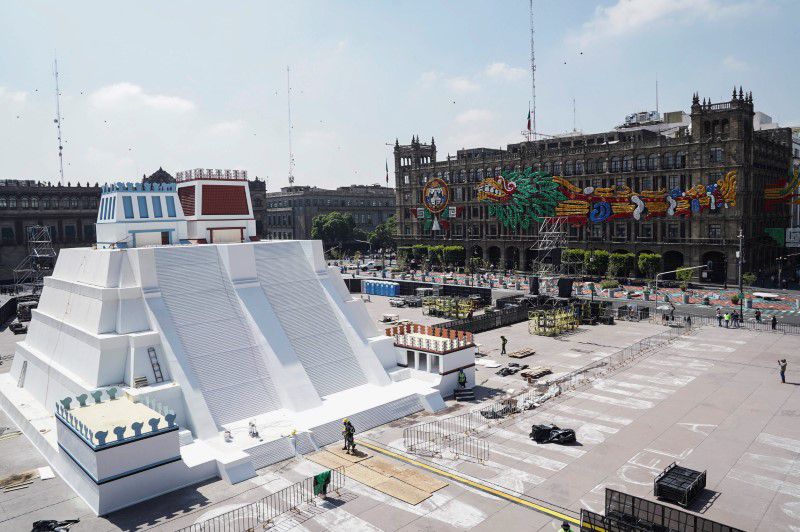On August 13, 1521, Spanish conquerors defeated the Aztecs. Their forces numbered 80,000 to 200,000 men, including allied indigenous peoples, against an almost equal number of Aztec troops. The capital city, Mexico-Tenochtitlán, had been under siege by Cortez since May of that year, and it was struck by the artillery of his almost 15 cannons and 13 brigantines that navigated the waters of Lake Texcoco. The city fell in June, forcing the defenders to retreat to the twin city of Mexico-Tlatelolco. A fierce combat ensued, in which the warriors of Emperor Cuauhtémoc tried to defend what was left of the Aztec floating city.
Poems in Nahuatl, the Aztec language, recall this event, and some of their verses have even been used to describe the massacre that occurred 447 years later in that very same place, when the Mexican military massacred hundreds of students. “The smell of blood damped the air; the smell of blood stained the air.” As the plaque in the archeological zone of the current Tlatelolco Housing Unit says: “It was not a defeat, nor was it a victory; it was the painful birth of the mestizo [mixed-race] people which make up today’s Mexico.”
While the discourse of “mestizaje” helped eliminate New Spain’s hateful caste system after Mexico’s independence, it also perpetuates the idea that, in Mexico, there is no racism. This idea has helped sustain the structural oppression of indigenous peoples in Mexico, which has led to massacres such as those in Acteal (Chiapas, 1997) and Aguas Blancas (Guerrero, 1995), as well as dispossession of natural resources by national and foreign mining companies and bottled water companies.
This is the kind of anti-indigenous racism and dispossession that Mexican president Andrés Manuel López Obrador (AMLO) is attempting to cover up with gestures, while at the same time, continuing the dispossession of indigenous people.
AMLO’s Administration: Empty Rhetoric and Showy Performances
After he took office, AMLO held an event to receive a ceremonial wooden staff from indigenous groups. This gesture represented the confidence that indigenous communities in Mexico had in his new administration, which promised that the centuries of humiliation, discrimination, and oppression would come to an end. The reality, however, paints a very different picture.
On Friday, August, 13, on the 500th anniversary of the Aztecs’ defeat, the Mexican regime’s “Fourth Transformation” (abbreviated as “4T”) will take the opportunity to showcase to the world that it acknowledges 500 years of indigenous resistance. AMLO’s administration has pushed for symbolic gestures to portray itself in an indigenous-friendly way for the occasion.
Some of these measures include renamings, such as the renaming of the “Plaza of the Tree of the Night of Sorrows” (“Plazuela del Árbol del Noche Triste” in Spanish) to the “Plaza of the Tree of the Victorious Night” (“Plazuela del Árbol de la Noche Victoriosa” in Spanish) to commemorate the night of June 30, 1520, when Cortez’s men were forced to flee from Tenochtitlán after massacring Aztec priests in the main temple while they were conducting a ceremony. After witnessing several of his men get wounded, drown with the gold they managed to sack in Lake Texcoco, or die at the hands of the Aztecs, Cortez fled to the village of Popotla, where, as legend has it, he sat near an ahuehuete tree to cry. This tree is the symbol of the small square that was recently renamed by Mexico City’s government, headed by Claudia Sheinbaum (aligned with AMLO’s party, MORENA).
Sheinbaum also renamed the Zócalo subway station. “Zócalo” is the popular name for Mexico City’s main square, referring to the pedestal of the independence monument that was originally going to be built there, but the name stuck, to the point where several central squares in state capitals are known as the city’s local “zócalo.” Now the subway station is known as “Zócalo-Tenochtitlán.” Likewise, the avenue Puente de Alvarado (Alvarado bridge, referring to Cortez’s captain Pedro de Alvarado), west of the Central Elm Park (Alameda Central), was renamed Tenochtitlán Avenue.
To top off these superficial gestures, the city government decided to build a replica of the Huey Teocalli, the Aztec main temple, which, atop its lavishly decorated structure, housed twin shrines for the gods Tlaloc, god of rain, and Huitzilopochtli, god of war. This replica, built from wood and fiberglass, sits right in front of the National Palace, the current presidential residence, in full view of AMLO’s balconies. The replica will measure about 15 meters and will hold light shows for visitors.
A few yards away from the replica, next to the Mexico City Cathedral, lies the original Huey Teocalli. Discovered by accident in 1978 by electric company workers, its structure was made of tezontle stones and stucco, originally measuring, according to legend, about 40 meters, dwarfing the replica. But beyond the fact that these ruins served as quarry for the construction of the adjacent Spanish churches and palaces, it also reflects the disdain that the 4T holds for actual historical artifacts, preferring to use rhetoric as empty and hollow as the wooden replicas that are being built.
The Huey Teocalli archaeological zone’s roof is still in disrepair after a hail storm caused it to collapse and partially damage some structures this is due in part to the budget cuts that AMLO’s administration has made for museums and the cultural sector in general, namely the Culture Secretariat and the National Institute of Anthropology and History (INAH, from its Spanish acronym), which has led to massive layoffs, precarization, and delays in payments. The movement #YaPágameINAH (#PayMeNowINAH) emerged in response to this austerity.
The previous neoliberal administrations of the PRI (a center-right party) and PAN (a Catholic far-right party) allowed the entrance of mining and hydroelectric companies and breweries, among other mega-projects that result in pollution. These parties’ policies differed little from those of the 4T on issues like employment. For example, during the last year of Felipe Calderón’s administration (PAN, 2006–12) labor reforms were introduced which legalized outsourcing, a model that Calderón’s successor, Enrique Peña Nieto (PRI, 2012–18) replicated with his education and communications reforms.
Real reparations for the damages and discrimination that indigenous communities have suffered for centuries will not come through rhetorical concessions like renaming dates, streets, and subway stations, but by putting an end to the interference and sacking of private national and imperialist companies that act with the approval of the Mexican government, no matter which party is in power, in alliance with U.S., Canadian, and European imperialism.
This cannot be done, as AMLO claimed at the start of his administration, by governing “for both rich and poor,” but by establishing a working-class government through the independent mobilization of workers, women, indigenous communities, environmental activists, the youth, and all oppressed by this criminal system, which has caused millions of deaths due to Covid-19. As we’ve covered, the 4T has been adamant in not taking the necessary measures to successfully combat the pandemic.
Reparations for the damages of centuries of oppression against indigenous peoples can only come from breaking with the parties in Congress, both the right-wing and the 4T, expropriating the capitalists, who have enriched themselves through dispossessing communities of their natural resources, and putting the fortunes of the capitalists at the service of the majority of society. By doing so, we could preserve the ancestral cultures of Mexico, restore the environment to have a more harmonious relationship with nature, and put technological advances toward making our lives easier and not for servicing the profits of capitalists, who steal every minute they can for the labor of millions, who are then condemned to misery.
Originally published in Spanish on August 10 in La Izquierda Diario México.
Translation by Óscar Fernández











